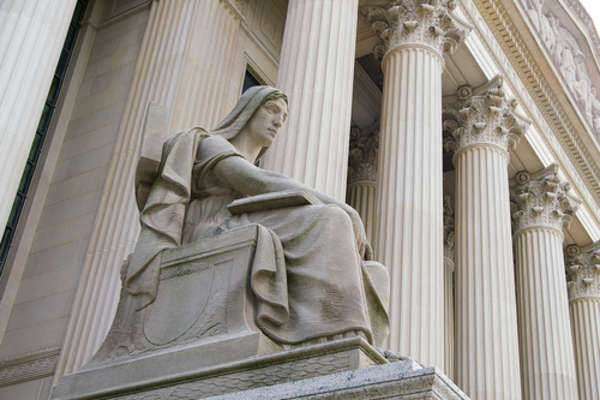Major Decisions-Marbury v. Madison
Marbury v. Madison is one of the most significant court cases in United States history. Its significance can be evaluated on different levels, however, the most
important is the fact that the case would grant the Supreme Court and the rest
of the Judicial branch extended powers not written into law by the Constitution.
Furthermore, it would be the first time that the Supreme Court would declare something as "unconstitutional", setting precedence over the responsibility and power of the Judicial Branch in times to come. Marbury v. Madison was the result of William Marbury petitioning the Supreme Court for a writ of mandamus in regards to his newly appointed position as Justice of the Peace in the District of Columbia. A writ of mandamus, in simple terms, is simply a petition to the courts that a specific action be taken or barred.
James Madison, the Secretary of State at the time, refused to deliver certainly documents to Marbury that would establish his new office on the contingency that such documents were not delivered during the Presidency of John Adams, whose term had expired. The matter was brought to the Supreme Court, with Marbury basing his claims on the Judiciary Act of 1789. John Marshall, the Chief Justice, upon examination of the Act and the Constitution, would encounter several factors that proved problematic. Marbury's main argument was based on the Judiciary Act of 1789, which would grant the Supreme
Court jurisdiction over writs of mandamus by the powers of Congress (See Also: Article I).

Marshall was faced with certain issues regarding the Constitution and the powers delegated to both Congress and the Supreme Court. Marshall and the Supreme Court
would have to address whether Article IIIof the Constitution sanctioned for Congress to modify original jurisdiction and if it had to power to do so. Furthermore, the original jurisdiction as defined in Article III provides for any written provisions regarding such practice, and if Congress modifies those Constitutional provisions, it becomes an issue of determining which of the two is to have more power. In the process, Marshall would be establishing the practice that is now known as judicial review.
Judicial review is one of the most important outcomes of this case because it would become the ability of the judicial branch to review practices of both the Legislative and Executive branches and declare laws unconstitutional. Judicial review is the power of the
courts to review laws or administrative practices and determine if they are within the confines allowed by the United States Constitution. Judicial review was established when Marshall used provisions in the Constitution that would lead him to state that the Congress did not have the power to modify the Supreme Court's jurisdiction.
The Judiciary Act and the Constitution would prove to be conflicting legislation. Marshall would also determine that any Congressional act that is in conflict with the Constitution could not be deemed as law. Because the Constitution is deemed as the supreme law in the United States, the Courts must follow it precisely as their main function in the Judicial Branch. Therefore, by establishing judicial review, the Court would be able to decide how and when laws of the United States and Constitutional law applied to a particular matter, and that the Supreme Court should uphold the Constitution in higher regard. If laws conflict with the Constitution, then through judicial review, the Supreme Court must deem them as unconstitutional.
Ultimately, Marshall would declare that the Judiciary Act of 1789 that was passed by
Congress was unconstitutional and would, therefore, be rendered invalid. In the case of Marbury v. Madison, Marbury would lose the litigation and never take the position of Justice of Peace that was originally appointed to him. Marbury v. Madison would become one of the most important Supreme Court cases in United States history, for it established the precedent of judicial review, thus granting the Judicial Branch certain powers over the Legislative and Executive branches. Judicial review would essentially employ the system of checks and balances, thus ensuring the democratic process and structure of the United States Government.